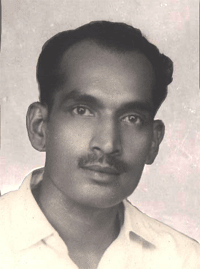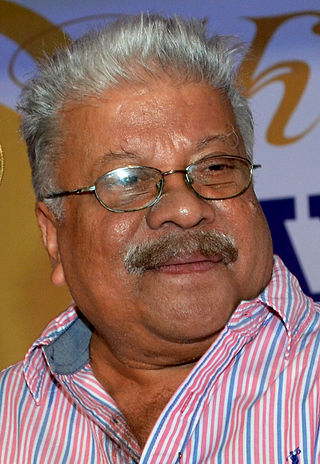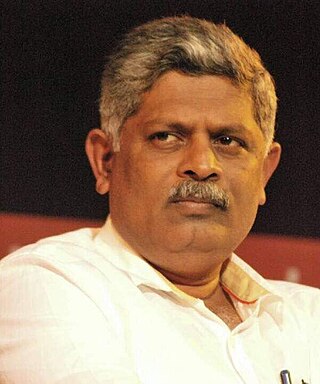Related Research Articles

Panikkassery Keshavan "P.K." Balakrishnan was an Indian novelist and critic. A doyen of Malayalam literature, he is best known for his novel, Ini Njan Urangatte, a novel based on Mahabharata as well as a number of critical studies which include Chandu Menon Oru Padanam, Novel Siddhiyum Sadhanayum, Kavyakala Kumaranasaniloode, and Ezhuthachante Kala: Chila Vyasabharatha Patanangalum. His Jathivyavasthayum Kerala Charitravum is a work in social history.

Kuppali Puttappa Poornachandra Tejaswi was a prominent Indian writer and novelist in Kannada. He also worked as a photographer, publisher, painter, naturalist, and environmentalist. He made a great impression in the Navya ("new") period of Kannada literature and inaugurated the Bandaaya Saahitya genre of protest literature with his short-story collection Abachoorina Post Offisu. He is the son of noted Kannada poet Kuvempu.

K. V. Ramakrishna Iyer, better known by his pen name, Malayattoor Ramakrishnan, was an Indian writer of Malayalam literature, cartoonist, lawyer, judicial magistrate, and Indian Administrative Service (IAS) officer. He was best known for his novels, short stories and biographical sketches and his works include Yanthram, Verukal, Yakshi and Service Story – Ente IAS Dinangal. He received the Kerala Sahitya Akademi Award for Novel in 1967. He was also a recipient of the Vayalar Award in 1979.

Punathil Kunjabdulla was an Indian writer from Kerala. A medical doctor by profession, Kunjabdulla was a practitioner of the avant-garde in Malayalam literature. His work includes more than 45 books, including 7 novels, 15 short story collections, memoirs, an autobiography and travelogues. His work Smarakasilakal won the Central and State Akademi Awards.
N. P. Mohammed, popularly known by his initials N. P., was an Indian novelist, short story writer and screenwriter of Malayalam language. Along with his contemporaries like M. T. Vasudevan Nair, O. V. Vijayan, Kakkanadan, and Madhavikutty, he was known to have been one of the pioneers of modernist movement in Malayalam fiction. He was the president of Kerala Sahitya Akademi and a recipient of several awards including Kendra Sahitya Akademi Award, Kerala Sahitya Akademi Award for Story, Kerala Sahitya Akademi Award for Novel, Lalithambika Antharjanam Award, Padmaprabha Literary Award and the Muttathu Varkey Award.
Malikathazhathu Pulluvazhy Narayana Pillai, affectionately known as Nanappan among his friends, was a journalist and writer of Malayalam literature. Known for his novel, Parinamam, and a number of short stories including Murugan Enna Pambatty and George Aaramante Kodathi, Pillai was associated with Far Eastern Economic Review and McGraw-Hill World News. He was awarded the Kerala Sahitya Akademi Award for Novel in 1991, but he declined the award.
Kainikkara Kumara Pillai (1900–1988) was an Indian teacher, actor, short story writer, essayist and playwright of Malayalam literature, best known for his plays such as Harichandra, Mathruka Manushyan and Mohavum, Mukhtiyum. He was the younger brother of Kainikkara Padmanabha Pillai, a noted author and thinker. An author of 18 books, Kumara Pillai was awarded the Kerala Sahitya Akademi Award for Drama in 1970. The Kerala Sangeetha Nataka Akademi inducted him as a distinguished fellow in 1975 followed by the Kerala Sahitya Akademi in 1986.

Smarakasilaka is a Malayalam novel written by Punathil Kunjabdulla in 1977. The story of the novel is woven around a mosque and its surroundings. The key figure is Khan Bahadur Pookkoya Thangal of the rich Arakkal family whose character is a rare mixture of dignity, benevolence and insatiable lust.

Kayar (transl. Coir) is a 1978 Malayalam epic novel written by Thakazhi Sivasankara Pillai. Widely considered one of the most seminal works in Malayalam literature, Kayar received many major literary awards, including the Vayalar Award.
The Malayalam novel is an important part of Malayalam literature. This article focuses on novels, written in Malayalam language, a Dravidian language spoken predominantly in the Indian state of Kerala and the Lakshadweep islands.
A. Santha Kumar was an Indian Malayalam language playwright and screenplay writer from Kerala state, South India. He won the Kerala Sahitya Akademi Award for Drama in 2010 for the work Maram Peyyunnu.

Kuppur Yalappa Narayanaswamy, also known as KYN, is a popular Kannada poet, scholar, critic, and playwright. He is currently a Kannada professor in the Maharani Cluster University, Bangalore. He is the author of many popular Kannada plays including Kalavu, Anabhigna Shakuntala, Chakraratna, Huliseere, and Vinura Vema. He has also translated Kuvempu's Shudra Tapaswi into Telugu. He is credited with adapting Kuvempu's magnum opus Malegalalli madumagalu into a 9-hour play. He has also written the screenplay for the films Kalavu and Suryakaanti.
Ronald Eaton Asher was a British linguist and educator specialised in Dravidian languages. He was a fellow of the Royal Asiatic Society of Great Britain and Ireland (1964), a fellow of the Royal Society of Edinburgh (1991) and an honorary fellow of the Sahitya Akademi.

Haleyuru Srinivasa Krishnaswamy Iyengar was a Kannada columnist, essayist, novelist, critic and teacher of Economics and Commerce studies in Mysore. He is remembered for his character sketches and short essays on personalities and issues of national & international import, in his weekly column "Varada Vyakthi". These appeared in the Kannada magazine "Sudha" continuously for nearly two decades. His literary critique "Kannadadalli Vidambana Sahitya" won him the Kannada Sahitya Akademi Award in 1981. His perspective on elements of Vishistadvaita in the works of Kuvempu were brought forth in his book "Kuvempu Sahityadalli Vishistadvaita – Darshana". H. S. K. penned close to thousand character sketches over two decades. These were later published in four collected volumes. He received the "Rajyotsava Award" from Government of Karnataka in 1997. For his lifetime contribution to Journalism and Kannada literature, the University of Mysore conferred a doctorate degree on him in 2004.
Palakkeezh Narayanan was a Malayalam language writer, academic and political activist from Kerala, India. For his outstanding contributions in the field of Malayalam literature, he received the Kerala Sahitya Akademi Award for Overall Contributions in 2019. Presenting the award, the then Chairman of Sahitya Akademi, Vaisakhan said that he was proud and happy to present the award to Palakkeezhu, who had worked for the Malayalam language, literature and culture with 100% dedication.

K. P. Sudheera is a Malayalam language writer from Kerala, India. She has published 86works in various genres, including novels, poetry, travelogues, biographies, memoirs, translations, letters, and children's literature. Many of her works have been translated to Hindi, Telugu, Tamil and Kannada languages. Kerala Sahitya Akademi has honoured Sudheera in 2022 awarding her Kerala Sahitya Akademi Award for Overall Contributions.

Sudhakaran Ramanthali is a Malayalam language writer and translator from Kerala, India. He has translated 27 works from Kannada to Malayalam. He received many awards including Karnataka Sahitya Academy Award for Translation and Sahitya Akademi Translation Prize.

Scaria Zacharia was an Indian linguist, professor and researcher. He was a member of numerous significant research initiatives that received global notice and collaborated with many linguists and cultural experts from other nations. He played a key role in recovering the archival knowledge and Malayalam manuscript from the University of Tubingen in Germany. Later he published the digital versions of the architects. In 2022, Thunchath Ezuthachan Malayalam University and Mahatma Gandhi University honoured him with honorary D lit. Scaria Zacharia is the winner of Kerala Sahitya Akademi’s Lifetime Achievement award. He died on 18 October 2022 due to age related issues.
Malayalanadu was a Malayalam-language Indian literary magazine published from 1969 to 1984, under the editorship of S. K. Nair. Based in Quilon, Kerala, the magazine emerged as one of the leading literary periodicals of its era. Malayalanadu played a significant role in shaping the cultural landscape of Kerala during the 1970s and early 1980s.
References
- ↑ "ಕೆ.ಕೆ. ಗಂಗಾಧರನ್". www.bookbrahma.com. Retrieved 2025-01-26.
- 1 2 3 "കെ.കെ. ഗംഗാധരൻ: മലയാളകഥകൾക്ക് കന്നഡ മൊഴിനൽകിയ വിവർത്തകൻ". Newspaper. 2024-03-11. Retrieved 2025-01-22.
- 1 2 3 4 5 Narasimhachar, Sudha (2010-07-07). "Keeping original essence, message and local aroma intact". Citizen Matters. Archived from the original on 2024-07-15. Retrieved 2025-01-22.
- 1 2 3 4 5 6 7 8 9 10 11 12 13 "മാധവിക്കുട്ടിയെ കന്നഡിഗർക്ക് പരിചയപ്പെടുത്തിയ മലയാളി വിവർത്തകൻ, കെ.കെ. ഗംഗാധരൻ വിടപറയുമ്പോൾ". Mathrubhumi . 20 January 2025. Archived from the original on 21 January 2025. Retrieved 22 January 2025.
- ↑ santosh.naik. "ಕೆಕೆ ಗಂಗಾಧರನ್, ನಾಗರತ್ನ ಹೆಗಡೆಗೆ ಭಾಷಾಂತರ ವಿಭಾಗದ ಕೇಂದ್ರ ಸಾಹಿತ್ಯ ಅಕಾಡೆಮಿ ಪ್ರಶಸ್ತಿ". Asianet Suvarna News (in Kannada). Retrieved 2025-01-22.
- 1 2 3 ലേഖകൻ, മാധ്യമം (2025-01-20). "കെ.കെ.ജി: നിശ്ശബ്ദനായ സാഹിത്യ സേവകൻ". www.madhyamam.com (in Malayalam). Archived from the original on 2025-01-21. Retrieved 2025-01-22.
- 1 2 3 4 ലേഖകൻ, മാധ്യമം (19 January 2025). "വിവർത്തകൻ കെ.കെ. ഗംഗാധരൻ ബംഗളൂരുവിൽ അന്തരിച്ചു | K.K. Gangadharan passes away in Bengaluru | Madhyamam". www.madhyamam.com (in Malayalam). Madhyamam. Archived from the original on 20 January 2025. Retrieved 22 January 2025.
- ↑ "Keralite translates 175 stories by Madhavikutty into Kannada". English Archives. 2019-12-21. Archived from the original on 2025-01-24. Retrieved 2025-01-22.